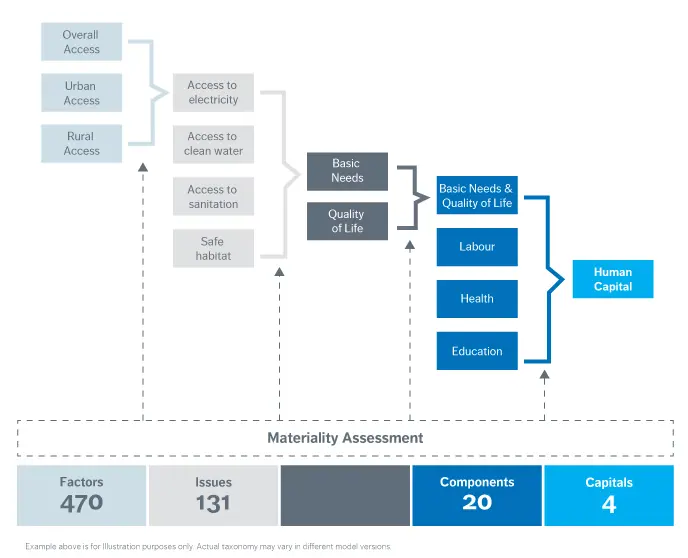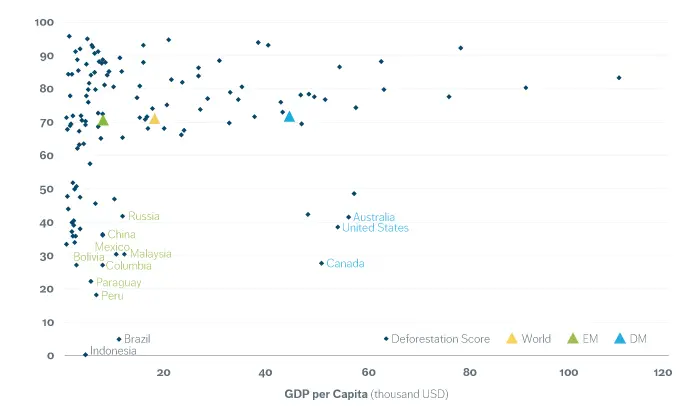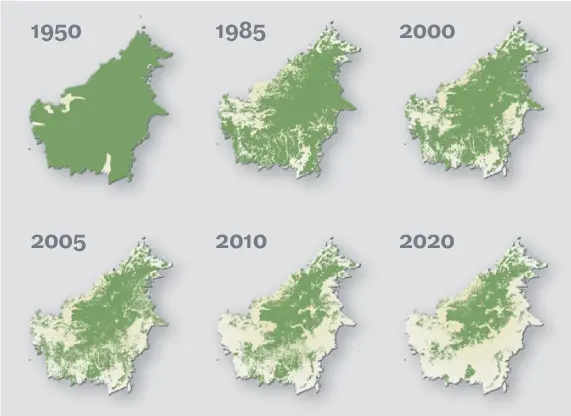Stepping inside the Model: 'Strong Sustainability' means Natural Capital Stands Apart
Candriam has been analyzing and scoring Sovereign Sustainability since 2009. Our third version of our model moves us beyond the traditional four-capital-pillar framework by recognizing that Natural Capital is both finite, and non-substitutable for Human, Social, or Economic Capital.
We believe our scores, constructed from 470 Factors for each country, are even more useful for the insights the components offer on individual topics in need of further study. The model is fed by a rich database, aiding our understanding of complex issues. We use both the data and the insights in our Candriam investment processes.
The increased weighting of natural capital to our overall country score affects country rankings versus our previous models – and versus the way other models might rank nations. Deforestation provides a crucial illustration.
For our full philosophy and approach to Sovereign Sustainability, download our paper, 'Natural Capital vs the Nature of Capital'.
Figure 1 - Materiality-weighted average of component scores
Focus: Deforestation
Within the Natural Capital pillar of our model, on of the 131 Issues we monitor is Deforestation. This is a prime topic for investors in certain sovereign nations, such as Indonesia and Brazil. It is also an important topic for everyone, for our broad understanding of the future of climate change implies that deforestation should be monitored closely.
Importantly, photosynthetic carbon capture by trees is one of the most efficient means of reducing the amount of carbon dioxide in the atmosphere. Studies estimate that the land available to plant trees could capture up to 25% of the CO2 currently in the atmosphere.[i] Although not without limitations, this is by far the cheapest way to slow climate change currently available. New technologies need further development, followed by widespread adoption, potentially at great cost. While we must continue the transition to renewable energy sources, replanting trees on already available land is a cost-effective and efficient way to capture atmospheric carbon on a large scale.
Initiatives are already in place in Ethiopia,[ii] India,[iii] Ireland,[iv] and the EU as a whole,[v] among others. A concerted and coordinated medium-term effort is required. One-off projects may capture headlines, but the example of Turkey[vi] shows that poor planning and execution can sharply reduce the effect.
Yet deforestation continues, especially in tropical regions, where emerging economies are clearing land for agriculture and for short-term timber profit. These effects are exacerbated by costly forest fires. Often led by regimes with little regard for science or for the global community, these countries make clear that a concentrated international effort will be required to reverse the trend. The extent of the problem is poorly documented, with officials attempting to hide the extent of the problem.[vii] Due to potential lack of reliable nationally-reported data, we draw on a variety of independent sources, such as satellite imagery of the change in forest cover.
Deforestation (Figure 2) is not limited to emerging countries. Australia, the United States, and especially Canada score poorly. This contradicts the theory that once a country achieves a certain level of development, deforestation can be reversed and the country will become more ecologically self-sustainable.
Figure 2 – Deforestation index versus GDP

Canada illustrates these interconnected phenomena – that developed nations are also failing to control deforestation, and that reported deforestation data is often 'misleading'. The Wildlands League of Canada’s Parks and Wilderness Society reports that approximately 40,000 football fields are cleared annually to construct roads and landings in the province of Ontario alone, or seven times what is officially reported for the whole of Canada Only 17% of Canadian logging in this province.[viii] This would suggest a staggering 650,000ha of deforestation in total over the past 30 years.
It is extremely worrying that countries with large territory are failing to act. In addition to the three large developed countries mentioned, other large countries such as Mexico, Russia and China also score very poorly on this measure. Deforestation is geographically widespread -- from North and Latin America, to Asia and Australia. We find Indonesia and Brazil especially worrying. While Brazil is by far the country with the greatest absolute loss of forests, Indonesia scores lower in our model, as an even greater proportion of the forested part of the country is disappearing. Without intense international pressure it is unlikely that these two examples would be reversed. The problem is well-known to the global community, and is aptly illustrated by the island of Borneo (Figure 3), which is shared between Indonesia (73% of territory), Malaysia (26%), and Brunei (1%).
Local measures must extend beyond environmental regulation. Rule of Law seems to be another key element, as a significant portion of logging is performed illegally.[ix] International pressure has shown early signs of progress, particularly in Brazil,[x] where the government has established a military response to illegal deforestation, along with organized measures to combat forest fires. Much more is needed. Trade relationships among nations must begin to embed meaningful environmental protections, along with control and enforcement.
The topic of deforestation is important to Candriam. In October, 2020 Candriam signed the Investors Policy Dialogue on Deforestation.
Figure 3 - Deforestation of Borneo – Tree cover over time

[i] J.-F. Bastin, Y. Finegold, C. Garcia, D. Mollicone, M. Rezende, D. Routh, C. M. Zohner, T. W. Crowther, “The Global Tree Restoration Potential” and Bastin, et al, “Response to Comments on ‘The global tree restoration potential’” Science, 5 July 2019 and 29 May 2020.
[ii] World Economic Forum. Ethiopia planted 350 million trees in a day. And its fight against deforestation does not stop there. 31 July, 2020. https://www.weforum.org/agenda/2019/07/ethiopia-has-planted-350-million-trees-in-a-day-to-tackledeforestation-
and-its-not-stopping-there/, accessed 18 November 2020.
[iii] Independent. India plants 66 million trees in 12 hours as part of record-breaking environmental campaign. 3 January 2018. https://www.independent.co.uk/news/world/asia/india-plant-66-million-trees-12-hours-environment-campaign-madhyapradesh-
global-warming-climate-a7820416.html, accessed 18 November 2020.
[iv] Forbes. Ireland Commits To Plant 440 Million Trees To Help Tackle Climate Change. 30 September 2019. https://www.forbes.com/sites/trevornace/2019/09/30/ireland-commits-to-plant-440-million-trees-to-help-tackle-climate-change/,
accessed 18 November 2020.
[v] NewScientist. EU plans to plant 3 billion trees and massively expand organic farming. 20 May 2020. https://www.newscientist.com/article/2244115-eu-plansto-plant-3-billion-trees-and-massively-expand-organic-farming/#ixzz6WJ6TsK1K, accessed 18 November 2020.
[vi] The Guardian. Most of 11m trees planted in Turkish project 'may be dead'. 20 January, 2020. https://www.theguardian.com/world/2020/jan/30/most-of-11m- trees-planted-in-turkish-project-may-be-dead?CMP=Share_iOSApp_Other, accessed 18 November 2020.
[vii] Deutsche Welle. Brazil's research chief sacked after deforestation row with Bolsonaro. 2 August 2019. https://www.dw.com/en/brazils-research-chiefsacked-after-deforestation-row-with-bolsonaro/a-49874119, accessed 18 November 2020.
[viii] Canadian Parks and Wilderness Society Wildlands League. Canada underreporting deforestation and carbon impacts by forestry. 14 December 2019. https://wildlandsleague.org/news/loggingscars/, accessed 18 November 2020.
[ix] Human Rights Watch. Rainforest Mafias - How Violence and Impunity Fuel Deforestation in Brazil’s Amazon. 17 September 2019. https://www.hrw.org/report/2019/09/17/rainforest-mafias/how-violence-and-impunity-fueldeforestation-
brazils-amazon, accessed 18 November 2020.
[x] The New York Times. Under Pressure, Brazil’s Bolsonaro Forced to Fight Deforestation. 1 August 2020. https://www.nytimes.com/2020/08/01/world/americas/Brazil-amazon-deforestation-bolsonaro.html, accessed 18 November
2020.

